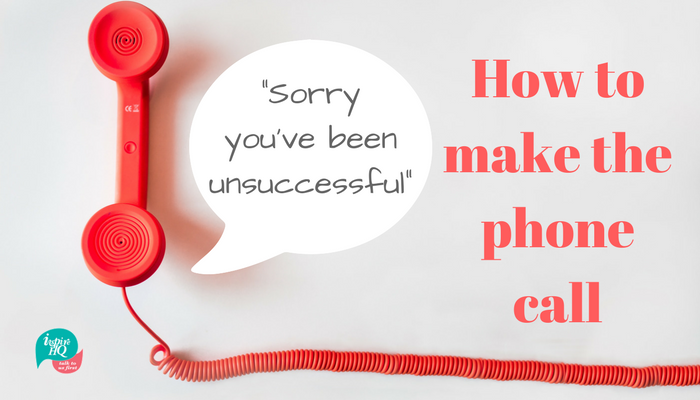Calling with bad news is never easy. There wouldn’t be many hiring managers or recruiters that enjoy the “sorry you’ve been unsuccessful” phone call. It’s probably why many don’t bother to make the effort. Or if they do make the effort they handle the call really poorly.
My personal opinion is that many avoid or dislike making the phone call because they are scared. Scared of how the candidate will take the news that they are unsuccessful and how they will respond. Scared that the candidate will ask for feedback or want to know why they were unsuccessful. Often in this instance they don’t know what the right thing is to say or what they can or can’t say so they end up handling the phone call really poorly and frustrating the job seeker.
I could tell you many horror stories that have been shared with me by frustrated job seekers who have been on the receiving end of a poorly executed “sorry you’ve been unsuccessful” phone call. Just this week a friend was asking my opinion on a poor experience she had when applying for a job with a large employer here in Ballarat. Frankly this employer should be conducting themselves better. My friend applied for a job (she invested quite a bit of time writing a response to their key selection criteria), was successful in getting an interview, took time off from her current job to attend the interview and then patiently waited to hear from this organisation.
Finally the phone call came. She was unsuccessful. She asked for feedback. The manager on the other end of the phone who had just delivered the “sorry you’ve been unsuccessful” message advised her that she couldn’t provide feedback now and that my friend would have to call back in a week. Sorry? You’ve made a decision that a particular candidate has been unsuccessful but you need a week to think about coming up with the reason why. Something doesn’t make sense here to me! Why could this organisation not provide some feedback? All my friend wanted was some feedback on where she fell down in the process so she can work on those areas. Shouldn’t we be praising her for wanting to better herself and being receptive to feedback?
I make these unsuccessful calls daily, it’s all part of being a recruiter. What never ceases to amaze me is how many candidates thank me for my honesty and feedback when I give them feedback along with the sorry you’ve been unsuccessful message. There are always the odd few that don’t take rejection well but in the majority of cases people are genuinely appreciative of the feedback provided.
If you have to pick up the phone and deliver the “sorry you’ve been unsuccessful” message here are my top tips for executing the call effectively:
- Prepare before you pick up the phone – it might be getting to the end of the recruitment process, you might be pushed for time but planning the call and having the key points or areas where the candidate scored lower or lacked skills or experience will help you deliver the feedback succinctly
- A little thank you goes a long way – put first things first when making these telephone calls. Thank the job seeker for their time and effort in putting together an application and in attending an interview. They’ve invested time and effort in the process and acknowledging them for this is common courtesy.
- Sometimes it’s not the words you say – be present. If you are making these phone calls make sure they have your full undivided attention. Often it’s not just about the words you say but how you say them. Be committed to giving the job seeker your full attention; use the tone of your voice to show you are engaged and that you genuinely care and value this step in the recruitment process.
- Be as specific as possible and answer questions – don’t fluff or waffle, provide the feedback and give the candidate the opportunity to ask questions.
- Timeliness – Don’t procrastinate with this phone call, making this call weeks later is pointless as the job seeker has already gathered that they haven’t been successful and making them call back at a later date for feedback is just a cop out.
These phone calls shouldn’t be feared, if done well they can be really rewarding in helping a candidate to develop themselves and their skills for next time they put themselves forward for a job. Getting these phone calls right will also be invaluable in building your brand as an employer of choice. Making the call and providing feedback really is a win-win for all involved.


